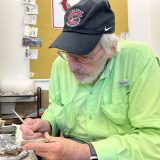Distinguished Visiting Professor of the Institute for Quantum Studies wins the Nobel Prize in Physics
October 8, 2013
François Englert, a Belgian theoretical physicist, and Distinguished Visiting Professor in Residence and founding member of the Institute for Quantum Studies at Chapman University in California, has won the 2013 Nobel Prize in Physics for his prediction of the Higgs Boson particle, which has helped the world’s physicists solve some of the deepest mysteries of the universe.
Announced this morning in Stockholm by the Nobel Committee on Physics, the prize recognizes Englert for proposing the Brout-Englert-Higgs Boson particle, which was recently confirmed by scientists at CERN – The European Organization for Nuclear Research – home of the largest particle accelerator in the world.
“The entire Chapman community joins me in congratulating Prof. Englert for this achievement,” said James L. Doti, Ph.D., President, Chapman University. “His discoveries have revolutionized the field of physics, and his work continues to break new ground. We are grateful for his presence here at Chapman, which enlivens the intellectual life of our campus.”
Just two weeks ago, Englert received the coveted “Citation Laureate” title from the worldwide news organization Thomson Reuters – a noted predictor of Nobel Prize recipients. Englert’s 1964 theory is one of the newest breakthroughs to be proven in the world of quantum physics and is part of the most successful scientific theory in history.
“The Brout-Englert-Higgs boson has deeply clarified our understanding of the universe, and Dr. Englert’s work with Chapman’s Institute for Quantum Studies continues to break new ground. We are extraordinarily fortunate that he is associated with us,” said Daniele Struppa, Ph.D., chancellor of Chapman University.
Institute co-director and Chapman University Professor Yakir Aharonov, Ph.D., noted, “As a friend and collaborator, I’d like to congratulate François and wish him the very best.”
Throughout his career Englert has made influential contributions in statistical physics, quantum field theory, cosmology, string theory and supergravity. He has previously been awarded the 2010 J. J. Sakurai Prize for Theoretical Particle Physics, the Wolf Prize in Physics in 2004 (with Brout and Higgs) and the High Energy and Particle Prize of the European Physical Society (with Brout and Higgs) in 1997 for the mechanism which unifies short and long range interactions by generating massive gauge vector bosons.
Chapman University Professor Jeff Tollaksen, Ph.D., co-director of Chapman’s Institute said, “As a friend, I am particularly delighted for this honor bestowed on him. Professor Englert’s achievements and reputation reflect his deep understanding of the quantum world. Many times in the past, a scientist’s research on deep physics questions led to significant practical applications such as computers and lasers. Professor Englert and the other esteemed members of our Institute for Quantum Studies have great hope for new ultra-powerful computers, which are based on discoveries arising from asking the kind of deep questions being studied at our Institute. This technology will again have a revolutionary impact on our quality of life.”
Englert graduated as an electrical-mechanical engineer in 1955 from the Université Libre de Bruxelles (ULB) where he received his Ph.D. in physical sciences in 1959. From 1959 until 1961, he worked at Cornell University, first as a research associate of Robert Brout and then as assistant professor. He then returned to the ULB where he became a university professor and was joined there by Robert Brout. Together Brout and Englert co-headed the theoretical physics group. In 1998 Englert became professor emeritus. Englert joined Chapman University’s Institute for Quantum Studies in 2011, where he serves as a Distinguished Visiting Professor in Residence.
Englert joins Vernon L. Smith, Ph.D., professor of economics and law and founding member of Chapman’s Economic Science Center, who won the 2002 Nobel in Economics; and Chapman Presidential Fellow Elie Wiesel, acclaimed author, human rights advocate and Holocaust survivor, who received the Nobel Peace Prize in 1989.
For more information on Chapman’s Institute for Quantum Studies, see www.quantum.chapman.edu.
